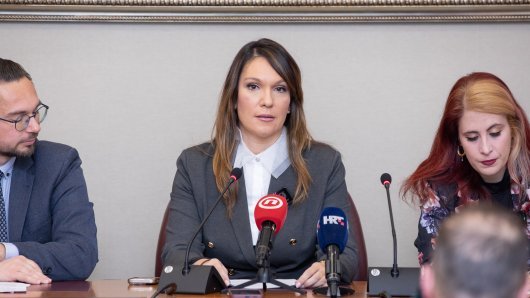Certain positive steps can be expected in 2011 but their intensity will only confirm what the central bank predicted two years ago - that Croatia's economic recovery will be long and slow, Croatian National Bank (HNB) governor Zeljko Rohatinski said in Opatija on Thursday, expecting this year's GDP to grow about one per cent.
"We are to blame for a lot," he said at the 14th conference on Croatia's money market.
According to his predictions, bank lending is expected to step up this year by some 9.5 per cent (HRK 26 billion), with a growth in household and corporate loans of some 7 per cent (HRK 17 billion).
The balance-of-payments deficit is estimated at about 2.5 per cent of GDP and the external debt is expected to stabilise at about EUR 46 billion.
The general government deficit is estimated at about 6 per cent of GDP.
The average exchange rate will be one euro for 7.40 kuna, and the average inflation rate is predicted at about 3 per cent.
Speaking of the monetary policy, Rohatinski recalled that after the consolidation of the financial system, the focus shifted to supporting the real sector and encouraging money supply by coordinating the monetary and fiscal policies.
Rohatinski said that was the topic of his first meeting with Prime Minister Jadranka Kosor in July 2009, when he said the HNB was willing to further reduce the compulsory reserve rate and warned about the too high fiscal deficit and the irrational structure of budgetary expenditures.
He said he also conveyed to Kosor his estimate that a combination of monetary and fiscal measures could result in the release of about EUR 2 billion for the economy by the end of that year. He added the meeting did not end with a concrete conclusion but "the cards were laid on the table."
Rohatinski said that was followed by a revision of the 2009 budget and the adoption of the 2010 budget, which he added did not bring essential fiscal changes.
He said the models for lending to entrepreneurs did not prove to be particularly successful and that 2010 saw an increase in non-performing loans, whose share in overall loans rose from 7.8 to 11.2 per cent.
Assessing the situation at the turn of this year, Rohatinski said the economy was in relative stagnation, the further decline in industrial production was especially unfavourable, and the construction sector remained in a deep depression.
The only positive impulse comes from the growth of exports and services, he said, adding that inflation was gaining speed, mainly due to food and liquid fuel prices.
Rohatinski recalled the positions of the European Commission and the European Central Bank that the growth of inflation called for special caution, that the country was externally more vulnerable due to the disparity between the exchange rate and domestic costs, and that efforts should be stepped up to curb salary growth and to implement other measures aimed at increasing competitiveness.
Rohatinski said the EC and the ECB also stressed the importance of implementing economic recovery and the law on fiscal accountability and that the use of the currency clause in deposits and loans should be reduced.
Similar assessments have been made by other financial institutions as well, such as the Fitch agency, which has warned about insufficient fiscal consolidation, a rapidly growing public debt, a below-average GDP growth, high foreign currency exposure and a high external debt.
"Such assessments should not be underestimated, notably in the context of the fact that this year's foreign financing requirements are EUR 17.9 billion, which is EUR 2 billion more than in 2010, and that the country's unfavourable rating could significantly affect that financing and its cost," said Rohatinski.
Finance Minister Martina Dalic said the Croatian fiscal policy did not give up on actively supporting the economic recovery, adding this support would focus on the strengthening and recovery of investments.
Dalic said the most important lesson to be learned was that one should save during good times so that one could spend during the biggest crises.
By adopting fiscal legislation, Croatia has shown that it is willing to accept those lessons, she said, adding that applying the fiscal accountability act in conditions determined by the structure of expenditures would not be easy.




































